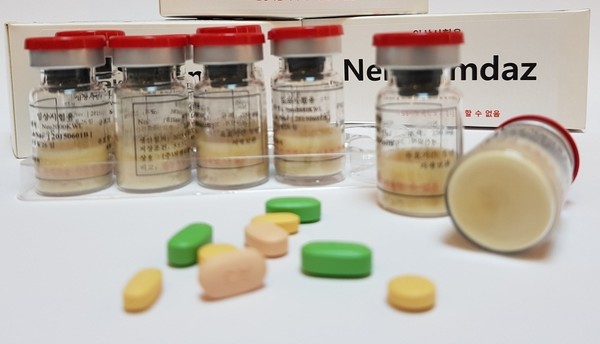The domestic biopharmaceutical companies are speeding up research to develop a drug to cure cerebral infarction, for which there is only one treatment worldwide currently.
The intravenous injection of recombinant tissue plasminogen activator (tPA), developed by Boehringer Ingelheim, is the only drug approved by the U.S. Food and Drug Administration to treat ischemic stroke caused by a lack of blood flow to a part of the brain.

GNT Pharma, Jeil Pharmaceutical, Shinpoong Pharmaceutical, and Yuyu Pharma are Korean front-runners in this area.
GNT Pharma, founded in 1998 by eight professors of neuroscience, pharmacology, ophthalmology, and cell biology, has focused on developing new brain cell protection drugs that can treat stroke and dementia. The company’s research team has developed Nelonemdaz, a new multi-target stroke drug, and Crisdesalazine for dementia, based on that stroke and dementia symptoms progress through multiple pathways.
Nelonemdaz protects brain cells that simultaneously control reactive oxygen species and N-methyl D-aspartate (NMDA) receptors that cause brain cell death in stroke and cardiac arrest patients. The safety of Nelonemdaz was first confirmed in phase 1 clinical trials conducted in the U.S. and China. The drug also demonstrated excellent efficacy in improving disability after stroke in phase 2 studies performed in China and Korea, with 447 patients receiving reperfusion therapy.
GNT Pharma is now conducting a phase 3 clinical trial in China for stroke patients who received thrombolytic drugs within eight hours.
“Our 23 years of research has begun to produce results as we began confirming the efficacy of our multi-target treatment for stroke in clinical trials with a new drug released for cognitive impairment in dogs,” GNT Pharma CEO Gwag Byoung-joo said. “New drugs for stroke and dementia are more likely to be developed within three to five years.”
Jeil Pharmaceutical is developing a poly ADP-ribose polymerase inhibitor (PARP1) inhibitor known as JPI-289.
The drug candidate prevents brain cell damage caused by reperfusion after removing a blood clot from inside an artery or vein through a surgical method or with tPA. It could also show the excellent therapeutic effect as it simultaneously inhibits several factors that induce stroke.
Jeil Pharmaceutical plans to end the ongoing phase 2 clinical trials of JPI-289 by the end of the second half of 2021 and aim to make technology transfer deals with global pharmaceutical companies when the study showed statistically significant results.
The company will also commercialize the drug by obtaining conditional approval after completing the study in Korea.
Shinpoong Pharmaceutical’s new drug candidate, SP-8203 (ingredient: otaplimastat), also had no significant increase in side effects when combined with tPA for stroke in the phase 2a clinical trial and showed potential to improve the size of cerebral infarction and modified Rankin Scale (mRS), commonly used to measure the degree of disability or dependence in the daily activities.
The company has started manufacturing the candidates for phase 3 clinical trials and secured enough research funds to conduct the study in Korea. It is also considering further partnering with more global pharmaceutical companies through technology transfer deals or joint researches.
Yuyu Pharma started joint research with the University of California Los Angeles (UCLA) to develop a new drug that helps recover patients who suffered a stroke.
The company plans to discover new drug candidates, and UCLA researchers plan to conduct non-clinical studies to develop new compounds further.
Yuyu will own the new therapy's exclusive marketing rights and intellectual property developed through the collaborated research.
“We will try to make the joint study with UCLA to help treat patients with stroke and their aftereffects.” Yuyu Pharma CEO Yu Won-sang said.

